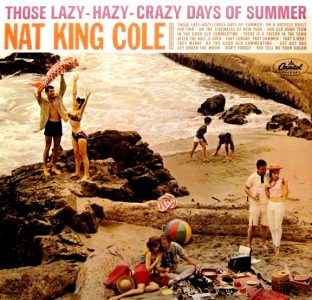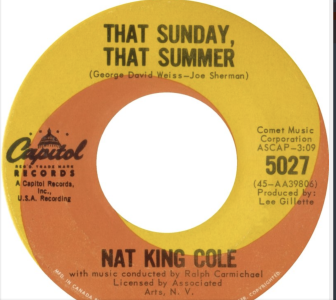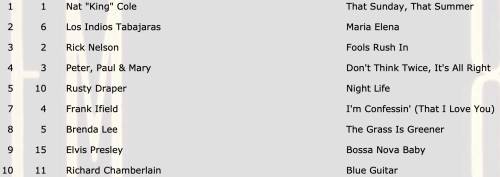#43: That Sunday, That Summer by Nat King Cole
City: Montreal, PQ
Radio Station: CJAD
Peak Month: October-November 1963
Peak Position in Montreal ~ #1
Peak position in Vancouver ~ did not chart
Peak Position on Billboard Hot 100 ~ #12
YouTube: “That Sunday, That Summer”
Lyrics: “That Sunday, That Summer”
Nathaniel Adams Coles was born in 1919 in Montgomery, Alabama. His family headed by his Baptist minister father, moved to Chicago in 1923. Cole learned to play the organ from his mother, Perlina Coles, the church organist. Coles first performance was the Billy Jones chart-topping 1923 hit, “Yes! We Have No Bananas”, at the age of four. Cole began formal piano lessons at 12, learning jazz, gospel, and classical music. As a youth, Cole joined the news delivery boys’ “Bud Billiken Club” band for an African-American newspaper called The Chicago Defender. At the age of 15, Nat Cole left school to follow a path in music. In 1936, with his bassist brother Eddie, Nat Cole became part of a sextet named Eddie Cole’s Swingsters. Cole was married in 1937 and moved to Los Angeles. He formed a band called the King Cole Swingsters. They were named after the British nursery rhyme Old King Cole (was a merry old soul…). ” The name next was changed to the King Cole Trio in anticipation of making radio transcriptions, and recording for small record labels.
In 1940, Nat “King” Cole recorded “Sweet Lorraine”. Though it was a non-charting single, it helped word about him spread across America. In 1942, Cole had a #1 R&B hit with “That Ain’t Right”. This was matched in 1943 with another chart-topping R&B hit “All For You”. The King Cole Trio had their first Top Ten pop hit record in 1944 with “Straighten Up And Fly Right”, that became their third number-one R&B hit in a row. While “Gee, Baby, Ain’t I Good To You” became a fourth chart-topper on the R&B chart. A more enduring song, “It’s Only A Paper Moon”, stalled at #5 on the R&B charts and #27 on the pop charts in 1944. Cole was the original house pianist for Jazz at the Philharmonic starting in 1944.
In 1946, the trio broadcast King Cole Trio Time, a 15-minute radio program. This was the first radio program to be hosted by a black musician. That year, the King Cole Trio had a #11 pop hit with “(Get Your Kicks On) Route 66”, which reached #3 on the R&B charts. As well, in 1946, the King Cole Trio had their second Top Ten pop hit with “You Call It Madness (But I Call It Love)”. But the year exceeded expectations when the King Cole Trio had a number-one hit on the pop charts with “I Love You, For Sentimental Reasons”. And that winter, they had a #3 pop hit titled “The Christmas Song (Merry Christmas To You)”. With its familiar opening line, “Chestnuts roasting on an open fire, Jack Frost nipping at your nose,” the song returned to the Top Ten of the Billboard Hot 100 in 2022 at #9.
From 1946 to 1948, the trio recorded radio transcriptions for Capitol Records Transcription Service. They performed on the radio programs Swing Soiree, Old Gold, The Chesterfield Supper Club, Kraft Music Hall, and The Orson Welles Almanac. In 1948, Nat King Cole had another number-one hit with “Nature Boy”.
In 1950, Nat King Cole and Stan Kenton had a #5 hit with “Orange Colored Sky”. This was exceeded by his number-one hit that year titled “Mona Lisa”, which won the Academy Award for Best Original Song. The next year, “Too Young” also shot to number-one. In 1952, Cole was featured with bandleader Billy May with a Top Ten hit titled “Walkin’ My Baby Back Home”. It was a cover of a pop standard first recorded in the 30s by Maurice Chevalier. In 1953, the #2 hit “Pretend” became one of his biggest sellers.
Into the mid-50s, Nat King Cole racked up more Top Ten pop hits that included “Answer Me, My Love”, “Smile”, “A Blossom Fell”, “Darling Je Vous Aime Beaucoup”, “Send For Me”, and “Looking Back”.
Into 1956, photographs of Cole with white female fans were circulated bearing such incendiary, boldface captions as “Cole and His White Women” and “Cole and Your Daughter.” At a concert on April 10, 1956, in Birmingham, Alabama, three men belonging to the North Alabama Citizens Council attacked Cole in an apparent attempt to kidnap him. When the incident happened, Nat “King” Cole had been singing “Little Girl” on stage with Britains’ Ted Heath Band.
“I can’t understand it,” Cole said afterwards. “I have not taken part in any protests. Nor have I joined an organization fighting segregation. Why should they attack me?” Cole wanted to forget the incident and continued to play for segregated audiences in the American South. He said he could not change the situation in a day. He contributed money to the Montgomery bus boycott and previously sued Northern hotels that had hired him but refused to serve him.
On October 14, 1956, Nat “King” Cole performed for President Dwight D. Eisenhower’s birthday celebration. On November 5, 1956, The Nat ‘King’ Cole Show debuted on NBC. The variety program was one of the first hosted by an African American. It ran until December 17, 1957. The program started at a length of fifteen minutes but was increased to a half-hour in July 1957. The show was never able to find a national commercial sponsor. Cole stated after the show was cancelled, “Madison Avenue is afraid of the dark.”
By the late ’50s, with the advent of rock ‘n roll, Nat “King” Cole was often being elbowed down the Top 40 the by new upstarts: Elvis Presley, Chuck Berry, the Everly Brothers, Little Richard, Jerry Lee Lewis, Bill Doggett, the Monotones, the Diamonds, the Dell-Vikings, the Rays, the Crickets, the Coasters, the Drifters, the Flamingoes, the Silhouettes, the Elegants, the Skyliners, the Platters, Ricky Nelson, Paul Anka, Bobby Darin, Connie Francis, the Fleetwoods, Brook Benton, and others. In 1959, Nat “King” Cole received a Grammy Award for Best Performance by a Top 40 Artist for his recording of “Midnight Flyer”.
Between July 1958 and July 1962, Nat “King” Cole released 24 singles. Only two of these made the Top 40, with “Time And The River” being the only one to crack the Top 30, peaking on the Billboard Hot 100 at #30.
In January 1961, Nat “King” Cole performed at the inaugural gala for President John F. Kennedy.
In the fall of 1962, Nat “King” Cole’s “Ramblin’ Rose” was edged out by The Four Seasons’ “Sherry” for the top spot on the pop charts. It spent three weeks at #2 on the Cashbox Top 100 Singles chart, and eight weeks in the Top Ten on the Billboard Hot 100. Cole had several more notable hits in 1963 from his album This Lazy Hazy Crazy Days Of Summer.

These included “Those Lazy Hazy Crazy Days of Summer” and “That Sunday, That Summer”.

“That Sunday, That Summer” was cowritten by George David Weiss and Joe Sherman. Weiss was born in 1921 in New York City and born into a Jewish family. He became an arranger for Stan Kenton and also Vincent Lopez. He had his first hit in 1945 with a number-one record for Frankie Carle and His Orchestra titled “Oh! What It Seemed To Be”. The song was also a number-one hit the following year for Frank Sinatra, and a Top Five hit for Dick Haymes and Helen Forrest, as well as Charlie Spivak and His Orchestra. In 1946, he cowrote “Surrender” which was a number-one hit for Perry Como. Later that year he received a lot of royalties from “Rumors Are Flying”. It was a number-one hit for Frankie Carle and His Orchestra, and a Top Five hit for Les Paul and the Andrews Sisters, as well as Betty Rhodes (among others). The Stardust’s had a Top Five hit in 1949 with Weiss’ “I Don’t See Me In Your Eyes Anymore”. And in 1950, “I’ll Never Be Free” was a #3 R&B hit for Dinah Washington, and a #3 hit on the pop chart for Kay Starr and Tennessee Ernie Ford. Later in 1950, “Can Anyone Explain?” was a Top Five hit for both the Ames Brothers and for Ray Anthony and His Orchestra.
In 1952, “Wheel Of Fortune” was a number-one hit penned by George David Weiss for Kay Starr on the pop charts. On the R&B charts the song reached #2 for both Dinah Washington and for the Eddie Wilcox Orch. Weiss also cowrote “Wimoweh” which climbed to #14 for the Weavers in 1952, and later a number-one hit in 1961 as “The Lion Sleeps Tonight” for the Tokens. That year he also wrote “Lullaby Of Birdland” which was recorded by Ella Fitzgerald. In the mid-50s, Weiss penned “Cross Over The Bridge” for Patti Page, “How Important Can It Be?” for Joni James, “Mr. Wonderful” for Peggy Lee, and the jazz standard “Too Close For Comfort” for Eydie Gorme.
In 1961, Weiss cowrote “Can’t Help Falling In Love” for Elvis Presley. He later penned “A Walkin’ Miracle” for the Essex, and “What A Wonderful World” for Louis Armstrong. In the 1970s, Weiss had Top Ten success on both the Billboard R&B charts and the UK pop charts for the Stylistics. Ten songs Weiss penned, including “Let’s Put It All Together”, cracked the Top Ten for the soul group. As well as hit songs, Weiss wrote scores for the films Murder Inc. (1960), Giget Goes to Rome (1963), and the psychological thriller Mademoiselle (1966). He was inducted into the Songwriters Hall of Fame. Weiss died in 2010 at the age of 89.
Joe Sherman was a songwriter, conductor, arranger, publisher and producer, who had his first success in 1955 with Perry Como’s recording of “June Box Baby”. The song was the B-side to the bigger hit “Hot Diggity (Dog Ziggity Boom)”. The B-side reached #10 on the Billboard pop chart in 1956. He also wrote “Ramblin’ Rose”, a number-one adult contemporary hit in 1962 for Nat “King” Cole, which also reached #2 on the Billboard Hot 100. As well, Sherman had success with “Eso Beso” which was a Top 20 hit in 1962 for Paul Anka. He produced “Heartaches By The Number”, a number-one hit in 1959 for Guy Mitchell. In 1960, Sherman conducted “My Heart Has A Mind Of Its Own” which was a number-one hit for Connie Francis. Born in Brooklyn in 1926, he lived to the age of 90 and died in 2017.
“That Sunday, That Summer” is a song about a moment in time when two people met and a love affair began – “darling when you smiled at me…” The song begins:
If I had to choose just one day
to last my whole life through,
it would surely be that Sunday,
the day that I met you.
The song fills with a list of auspicious accompaniment to the couple meeting: whippoorwills singing, summers arrival and daffodils that whisper “Go on kiss her, go on and kiss her.”
“That Sunday, That Summer” climbed to #1 in Montreal, #2 in Reading (PA), Pittsburgh, #3 in Erie (PA), #4 in Milwaukee (WI), and Tuscaloosa (AL), #5 in Philadelphia, #6 in Los Angeles, Buffalo, St. Louis, #8 in San Jose (CA), Columbus (OH), Fall River (MA), Cleveland, #10 in Rockville (MD), and Hamilton (ON), and #11 in Denver and Louisville (KY).
In the fall of 1964 it was discovered that Cole, a lifelong heavy smoker, had lung cancer. An operation to surgically remove his left lung was successful on January 25, 1965. However, his cancer was terminal. Nat “King” Cole died at the age of 45 on February 15, 1965. His funeral on February 18, 1965, included Honorary pallbearers included Robert F. Kennedy, Count Basie, Frank Sinatra, Sammy Davis Jr., Johnny Mathis, George Burns, Danny Thomas, Jimmy Durante, Capitol Record executive Alan Livingston, Frankie Laine, Steve Allen, and California Governor Pat Brown.
With the advent of television, Nat “King” Cole appeared on many TV programs between 1950 and 1964. This included The Ed Sullivan Show, the Texaco Star Theater hosted by Milton Berle, The Jackie Gleason Show, The Red Skelton Show, The Colgate Comedy Hour, The Dinah Shore Chevy Show, The Patti Page Show, The Perry Como Show, The George Gobel Show, The Steve Allen Show, This Is Your Life, The Garry Moore Show, The Danny Kaye Show, The Jack Benny Program, and The Jack Paar Program.
His 1957 recording of “When I Fall in Love” reached #4 in the UK charts in December 1987. In 1990, Cole was posthumously awarded a Grammy Lifetime Achievement Award. A United States postage stamp with Cole’s likeness was issued in 1994. And in 2000, Nat “King” Cole was inducted into the Rock and Roll Hall of Fame. In 2020, Cole was inducted into the National Rhythm & Blues Hall of Fame.
May 30, 2025
Ray McGinnis
References:
Paul Weeks, “From the Archives: Nat “King” Cole dies of Cancer, age 45,” Los Angeles Times, February 16, 1965.
“Nat “King” Cole Attacked on Stage” Guardian, April 12, 1956.
Maura Reynolds, “It’s All Right to Still Like Ike : History: Once painted as a ‘distanced’ President, Dwight Eisenhower now is heralded for his strong sense of service,” Los Angeles Times, October 16, 1990.
Margalit Fox, “George David Weiss: Writer of Hit Pop Songs, Dies at 89,” New York Times, August 24, 2010.
“Joseph Sherman Obituary,” New York Times, June 4, 2017.

CJAD 800-AM Montreal (PQ) Top Ten | November 9, 1963
The third week in a row at #1 for “That Sunday, That Summer” on CJAD

Love many of Nat King Cole songs.
This survey from November of 1963 was just one month before the start of the British Invasion.